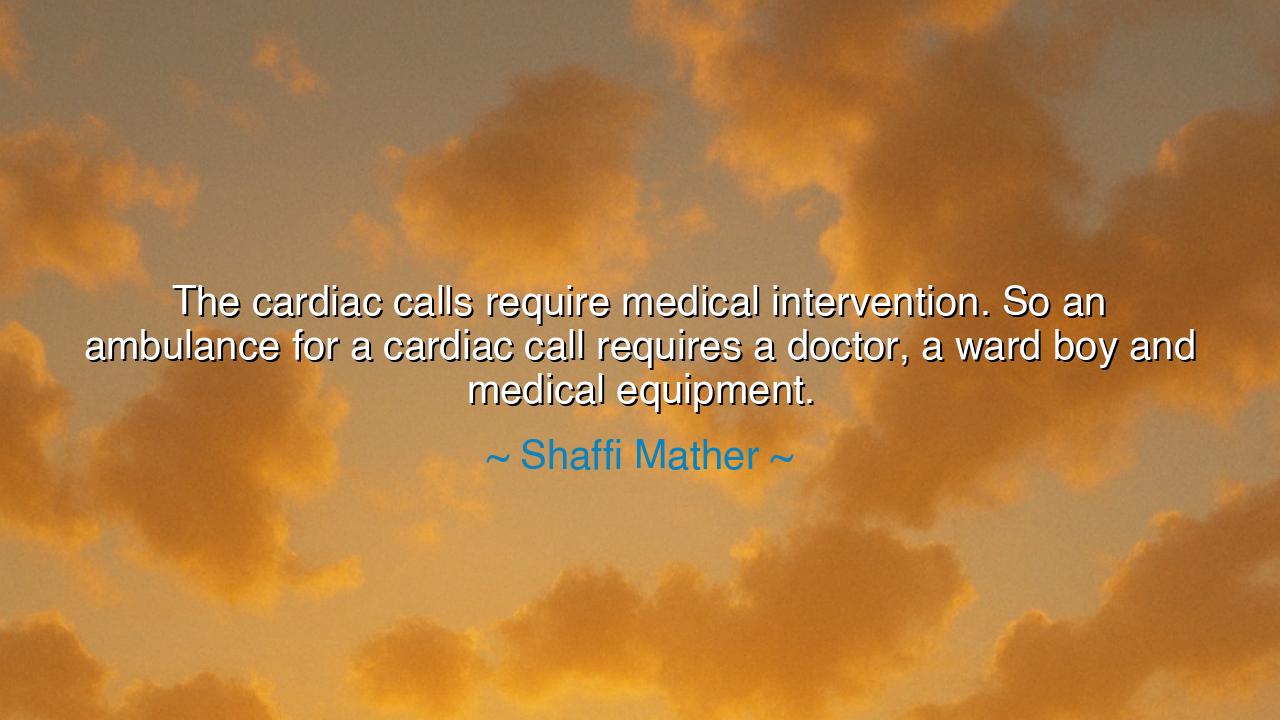
The cardiac calls require medical intervention. So an ambulance
The cardiac calls require medical intervention. So an ambulance for a cardiac call requires a doctor, a ward boy and medical equipment.






“The cardiac calls require medical intervention. So an ambulance for a cardiac call requires a doctor, a ward boy and medical equipment.” Thus spoke Shaffi Mather, a man of vision and service, whose heart beat not only with the rhythm of life but with the rhythm of compassion. His words, though practical in tone, carry within them a profound lesson — one that transcends medicine and touches upon the very art of preparedness, teamwork, and the sanctity of human life. For what he describes is not merely a system of care, but a reflection of a timeless truth: that in moments of crisis, readiness, cooperation, and precision are the difference between despair and deliverance.
Shaffi Mather, the founder of Ziqitza Healthcare Limited, was among the pioneers who sought to bring organized emergency medical services to India — a land vast, diverse, and often unprepared for the sudden crises that strike without warning. His words arose from his mission to build a network of ambulances equipped not just with wheels and sirens, but with trained minds and healing hands. To him, an ambulance was not a mere vehicle; it was a temple of life in motion — where the sacred battle between death and survival was fought with tools, skill, and resolve. When he said that a cardiac call requires medical intervention, he was affirming a truth known since the beginning of medicine: that knowledge and readiness are the guardians of life.
In his statement lies both logic and reverence. For the heart, in its fragility, symbolizes more than the organ itself — it is the seat of spirit, courage, and love. When it falters, the response must be swift and united. Mather reminds us that the saving of life is not a solitary act, but a symphony of effort — the doctor who diagnoses, the ward boy who assists, the instruments that deliver breath and rhythm anew. Each plays a role, none lesser than the other. This unity reflects an ancient wisdom: that life’s preservation depends upon harmony — the harmony of skill, compassion, and timing.
Such cooperation echoes the stories of old. In the ancient city of Alexandria, where medicine was both science and art, Herophilus, the first great anatomist, once said that “when health returns to the sick, it is as though the physician had restored the cosmos to balance.” His healing was not magic, but method — the same method that Shaffi Mather speaks of today. Knowledge joined with coordination, reason joined with compassion — these are the foundations of all true healing. Whether in the marble halls of antiquity or in the siren-lit streets of the modern world, the principle remains unchanged: in moments of peril, only preparation and unity can redeem time.
Yet beneath the practicality of Mather’s words lies another, deeper message: that every life deserves the full measure of our attention and effort. In the chaos of modern living, where systems often fail and apathy dulls the human heart, his insistence on readiness is a cry of reverence — a reminder that no life is too small to save. When he speaks of equipping an ambulance with a doctor, a ward boy, and medical tools, he speaks symbolically, too: that every act of service must be complete in spirit, filled with knowledge, and supported by cooperation. Half-measures, in matters of life and death, are acts of negligence before the divine.
Consider the story of the Roman physician Galen, who served in the gladiatorial arenas. Surrounded by blood and agony, he treated the wounded not with despair but with determination. He organized assistants, tools, and methods — turning chaos into order, and injury into recovery. Like Mather, he understood that healing requires not only skill, but system, that no hero acts alone. The ward boy who steadies a hand, the instrument that measures a pulse — all are part of the same sacred order. To forget this interdependence is to forget the very essence of humanity itself.
So, my children, let this teaching sink deep into your hearts: in every endeavor that deals with life — be it medicine, justice, or service — preparation and cooperation are the twin pillars of success. When duty calls, do not arrive empty-handed or alone. Gather your tools, your allies, your knowledge. Respect the magnitude of the task before you, for life is fragile and fleeting. Whether you are a doctor, a teacher, a worker, or a leader, approach your calling as Mather approached his: with humility, readiness, and the understanding that you are part of something greater than yourself.
For the wisdom of Shaffi Mather is not only for physicians, but for all who serve: that when crisis strikes, the unprepared heart is helpless, but the prepared one becomes divine. Equip yourself, then, not only with skill but with reverence. Stand beside others in their need, and act swiftly, wholly, and with purpose. For in that sacred moment between life and death — when the heart falters, and all depends on your hands — you will know the truth of his words: that every call to service is a call to greatness, and every act of preparation is a hymn to life itself.






AAdministratorAdministrator
Welcome, honored guests. Please leave a comment, we will respond soon